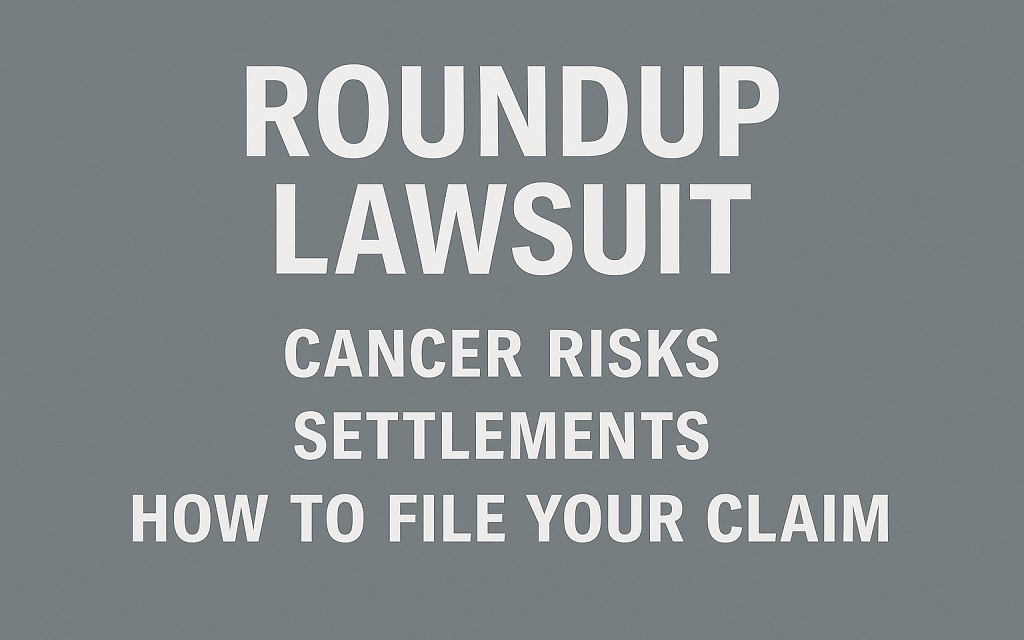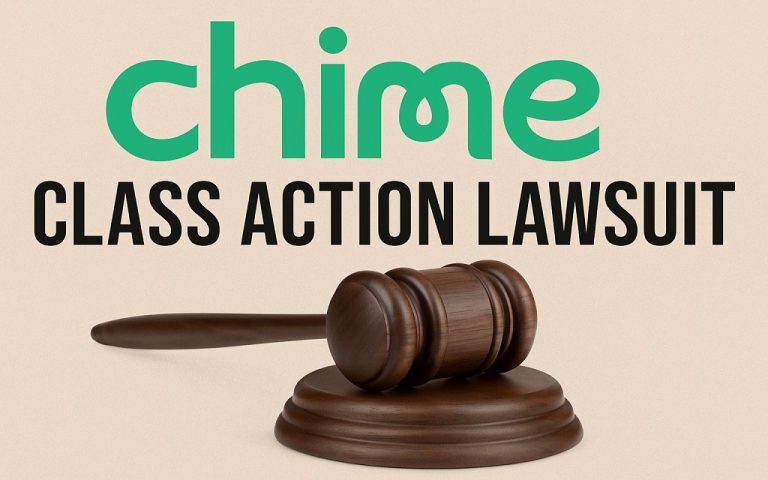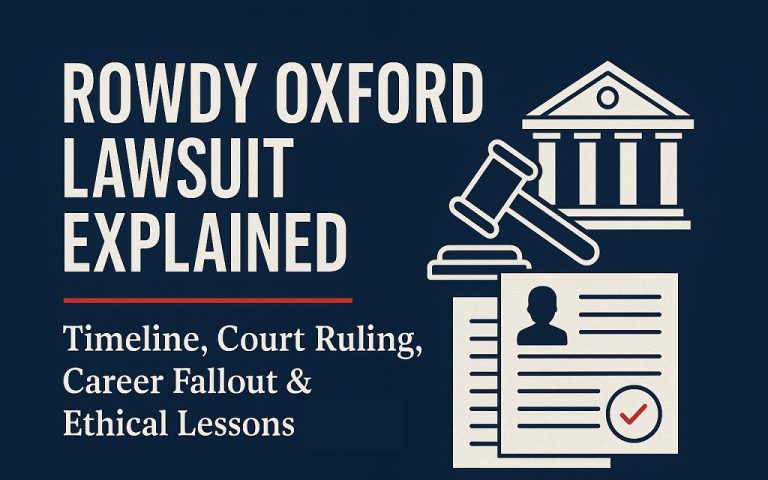You may have heard many things about the Round Up lawsuit. It is essential to know the real facts. You can use this blog article to understand why people file claims, how much money they may receive, and what legal steps are most important. You will see clear answers backed by data, examples, and recent court updates.
What Is the Round Up Lawsuit?
The Round Up lawsuit is among the largest mass torts in American history. Many claim that using Round Up, a popular weed killer produced by Monsanto (now owned by Bayer), caused them to acquire non-Hodgkin lymphoma (NHL) and other cancers. Numerous cases claim that glyphosate, the primary component, is the cause of the issue.
Bayer has faced more than 125,000 claims, paying nearly $11 billion so far. The number of lawsuits continues to grow in 2025. New verdicts have awarded individual victims up to $2.1 billion.
Why Do People Sue Over Round Up Weed Killer?
First, you should understand what Round Up is. Round Up is a well-known herbicide. Farmers, landscapers, and homeowners commonly use it. The main chemical is glyphosate.
It is essential to recall that the International Agency for Research on Cancer (IARC) classified glyphosate as a “probable human carcinogen” in 2015. Numerous studies have linked glyphosate to an increased risk of non-Hodgkin lymphoma. A 2019 study that was published in Mutation Research found that exposure to high levels of glyphosate elevated the risk by 41%.
You can see why thousands started filing lawsuits. People want Bayer and Monsanto to pay for medical bills and suffering. Bayer bought Monsanto in 2018 for $63 billion. Now Bayer faces most of the lawsuits.
How Many Round Up Lawsuits Exist Now?
You should look at the numbers. Bayer already paid nearly $11 billion to settle around 125,000 cases. Reports show thousands more cases are active in 2025.
Juries still hear new Round Up cancer trials. For example, in May 2025, a Florida jury awarded a gardener $175 million. A Georgia jury awarded a man $2.1 billion in March 2025. These figures illustrate why the number of lawsuits continues to rise.
What Types of Cancer Are Linked to Round Up?
You should focus on non-Hodgkin lymphoma. Many scientific papers, including a 2024 review in Frontiers in Oncology, list NHL as the top concern.
Other lymphoma subtypes also appear in lawsuits:
- Follicular lymphoma
- Diffuse large B-cell lymphoma
- Chronic lymphocytic leukemia
Doctors often provide expert opinions in these cases. You should get medical records if you suspect your cancer came from glyphosate.
How Do Courts Handle the Round Up Lawsuit?
It is essential to note that most cases are joined in a multidistrict litigation (MDL) in California. This helps manage thousands of similar lawsuits. The MDL allows one judge to handle discovery and pretrial motions.
Unlike a class action, you still have your case. You could get compensation based on your unique facts. If no settlement is reached, your case will be returned to your local court.
What Are Average Round Up Settlements?
You should expect most settlements to fall between $100,000 and $200,000. The exact payout depends on factors like:
- How old were you at diagnosis
- The type and stage of your cancer
- Medical costs and future care
- Lost work and income
- Pain and daily problems
Some jury verdicts break records. Still, you should not rely on billion-dollar results. Most people view offers in terms of their direct financial and health losses.
What Are Recent Round-Up Verdicts?
You can look at significant examples to see how courts rule:
- May 2025: A Florida man won $175 million after 20+ years using Round Up.
- March 2025: A Georgia man received a $2.1 billion verdict, the largest Round Up verdict yet.
- April 2025: Bayer asked the Supreme Court to block more cases. The high court has not yet taken the appeal.
These verdicts show juries still believe glyphosate can cause cancer. That shapes how Bayer negotiates new settlements.
What Defenses Does Bayer Use?
It is essential to know that Bayer uses several defenses. They contend that glyphosate is safe, as per EPA regulations. When the EPA last examined glyphosate in 2020, it was found to have “no human health risks when used as directed.”
Additionally, non-Hodgkin lymphoma has several causes, according to Bayer. Age, genetics, and viruses all play roles. Studies showing no connection to cancer are frequently presented in court by Bayer attorneys.
However, a large number of juries support plaintiffs. They see internal Monsanto emails showing efforts to shape research and downplay risk.
Must Read: What Should You Know About the Monsanto Roundup Lawsuit?
Are You Eligible to File a Round Up Lawsuit?
You should review the basic points to determine if you may qualify. You could have a case if:
- You used Round Up for years at work or on your property.
- You later got diagnosed with non-Hodgkin lymphoma or a similar blood cancer.
- Your doctor believes Round Up could be a factor.
Most Round Up lawyers offer free case reviews. They review your work history, receipts, and medical records.
How Long Do You Have to File a Round Up Claim?
Each state sets its statute of limitations. Many allow 2 to 4 years after a cancer diagnosis to sue. Some states give more time if you only recently learned that Round Up could be the cause.
It is crucial to file fast. Missing a deadline usually means you forfeit your right to any compensation.
What Evidence Helps Your Round Up Lawsuit?
You can help your lawyer by keeping strong records. Important documents include:
- Receipts or logs showing you bought or sprayed Round Up
- Work records from farms, golf courses, or landscaping
- Cancer diagnosis paperwork
- Notes from doctors linking glyphosate to your NHL
- Family statements on your daily struggles
Lawyers often bring in toxicology and oncology experts. They show how glyphosate might change human cells and start cancer.
How Do You File a Round Up Lawsuit?
You should start by consulting a lawyer who specializes in cases involving herbicide-related cancer. They offer a free case review. If they accept your case, they file it in federal court or a state court that accepts Round Upsuits.
Most lawyers work on contingency fees. You pay nothing upfront. They only get paid if they win money for you.
Cases then enter discovery. Lawyers often exchange evidence and attempt mediation. If no deal is reached, the case will proceed to trial.
What Can You Do Now?
It is a good idea to gather your records. Write down your years using Round Up. Keep all your cancer treatment bills.
Then speak to a lawyer. You protect your rights and prevent the statute of limitations from running. Even if you only used Round Up around your home, you may still have a case.
How Does the Round Up Lawsuit Help Public Safety?
You can see how these lawsuits push for more safety. Bayer said it will remove glyphosate from most lawn products in the U.S. soon. Glyphosate is still widely used on farms, though.
Additionally, settlements help families cover the costs of hospital stays, chemotherapy, and lost income. Juries convey the idea that concealing dangers might result in significant costs.
What Questions Should You Ask Your Lawyer?
You can make a short list to stay prepared:
- Do you handle many Round Up cancer cases?
- What costs do I pay if we lose?
- How long might my case take?
- May I participate in a global settlement or proceed with my trial?
- What is the average Round Up settlement now?
What Final Facts Should You Remember?
It is crucial to note that Round up lawsuits show no signs of slowing down. New verdicts appear every few months. Studies keep fueling debates over glyphosate.
If you or a loved one has non-Hodgkin lymphoma, you deserve answers. The law may provide a way to cover massive medical bills and lost wages. You protect your family by acting quickly.
Disclaimer: This article provides a general overview of Round Up Lawsuit, based on publicly available information, and is intended for informational purposes only. It does not constitute legal advice.
Musarat Bano is a content writer for JudicialOcean.com who covers lawsuits, legal news, and general legal topics. Her work focuses on research-based, informational content developed from publicly available sources and is intended to support public awareness. She does not provide legal advice or professional legal services.




